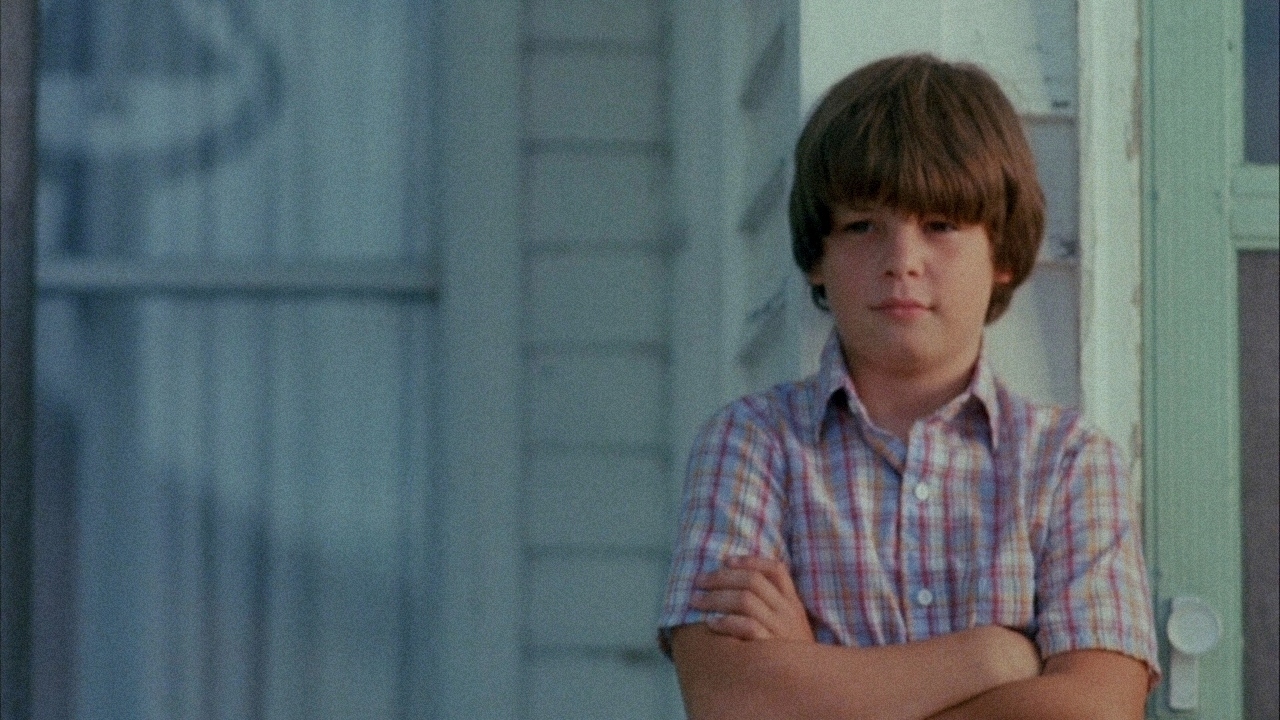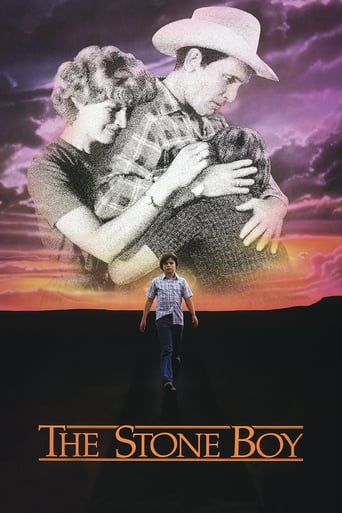

Please don't spend money on this.
... View MoreA lot more amusing than I thought it would be.
... View MoreIt's not great by any means, but it's a pretty good movie that didn't leave me filled with regret for investing time in it.
... View MoreEasily the biggest piece of Right wing non sense propaganda I ever saw.
... View MoreIt's hard to say sometimes why exactly a film is so effective. From the moment I first came across "The Stone Boy", something told me it would be a great film. In spite of that, it seemed very unlikely that I'd ever have the opportunity to actually see it for myself. Then, one day, while looking through the online catalogue of my local library, I saw that they had recently purchased the DVD release of this film. Which I'm extremely glad for, because the cinematography is of a stunning depth and quality that an old VHS copy could never replicate.And speaking of the cinematography, I must single it out as far and above the most stunning aspect of this film. As a photographer who pursues very nearly the exact visual style portrayed in "The Stone Boy", I'm a firm believer in the fact that a great cinematographer can almost single-handedly carry a film. Here, he has a lot of help from an extremely talented cast, and a director who understands perfectly what the story needs. But to have Juan Ruiz Anchía behind the camera makes virtually every scene something of beauty. And you can almost never say that. Most films would never even expect such a thing of you. Scene after scene captures some detail, some little bit of visual magic that takes your breath away.The director, Christopher Cain, has had a long and interesting career. As far as I can gather, this film is not very representative of it. But, sometimes, to catch a director near the beginnings of his career, before all the big budgets and loss of focus, there's a real subtle magic to be found. Cain steps back in this film, lets things happen with a life of their own, and then ever further. Much like early John Sayles films, characters are given space to breathe, time to talk. Side stories happen because they do, and that's how life is. Cain displays a remarkable, raw, even outright painful understanding of human nature in this film.The acting ties much of this story together. When people talk, when they exist in this film, they do so as actual people, not held back by the fact that they are playing characters. Gina Berriault's script allows immensely talented and respected actors like Wilford Brimley, Robert Duvall, Glenn Close, and Frederic Forrest to spend time simply existing. Whether the things they have to say are minor or of deep significance, it all comes down with the weight of pure reality.When you look at the actors involved, or the great soundtrack by James Horner, it seems strange that such a film be very nearly forgotten. Maybe much of what makes "The Stone Boy" what it is was the time period it was made in. There's this 1970s hangover feeling to this picture that reminds me deeply of my own childhood. People talk of the 80s in terms of modern styles and music, but that's not the 80s I lived in or remember. The look of the images, the understated and dark knowing quality of the acting, and the overall result should get under the skin of any person who grew up in or near this era of time in rural North America. I see myself in this. I see how I saw the world. And a film like "The Stone Boy" sees the world for how it truly is.For more of this feeling, please see:The Black Stallion (1979), Never Cry Wolf (1983), Tender Mercies (1983), Testament (1983), Places in the Heart (1984), Matewan (1987), High Tide (1987), Driving Miss Daisy (1989), The Secret Garden (1993), The Secret of Roan Inish (1994), Wendy and Lucy (2008)
... View MoreBoth Robert Duvall and Glenn Close played their roles with such believability, I simply cried. Glenn Close's role as Ruth, showed her wanting to deal with the situation, but she was under the domination of her husband. "Let him think about what he did," Robert Duvall's character, Joe, said staunchly. The story depicted a rural family dealing with an accidental death of a son by his brother, called "The Stone Boy," meaning he was so distraught and overwhelmed by what he did, he became emotionally paralyzed. Then towards the end when Jason Presson's character, Arnold, let it all out to a stranger, I was so broken hearted for him, that I actually thought of some of the terrible things that I did in my life. I personalized and identified with his character. Frederick Forrest's and Gail Youngs' roles, did NOT add not much to the film. I thought of Frederick Forrest, who played Ruth's antagonistic, womanizing brother, Andy, as a jerk who did nothing to try to help the situation. His wife, Lou, played by Gail Youngs, acted like a crazy-lady smacking Arnold around out of frustration with her own problems without pity and blaming him for her troubles. I could NOT really feel sorry for these two. Though Lou tried to keep her marriage together, she was unsuccessful. Both did NOT deal with their problems effectively. They really did NOTHING for the film and were totally ridiculous. Wilfred Brimley's minor role as the grandfather was, touching for he was the only character that showed Arnold any attention. I felt his role should have been elaborated. The players were just doing what they felt was adequate and sufficient. However, I really liked the ending so much, I actually smiled and cried tears of joy. I felt good. The Hillermans were a family again. I actually wanted to be a part of this family. They were so realistic.
... View MoreI don't think a movie like this would be released today. It takes it's time to present the depth of the characters and the plot isn't full of twists and turns to keep you on the edge of your seat.But, what this film does have: an interesting study in how families' deal with grief. How when the language for healing and over-coming tremendous loss leaves us mute, and we rely on raw emotions instead. Grief without reason and patience is anger, even hate. And unfortunately, the lead character (a young boy who accidently shoots and kills his brother while hunting) in the film is given more than his fair share of it. He eventually leaves and moves in with his grandfather (Wilford Brimley) who makes it clear to him that it WAS an accident. I got the impression that this young man knew that in his heart, but needed to hear those words from his parents, and to receive their forgiveness.What I loved about this film: the lack of dialog. There was a tremendous emphasis on physical reaction, facial expressions. And the slower pace of the film allows you to really watch the reactions of the actors. Something we don't get to do alot of with today's films.
... View More12 year old Arnald Hillerman accidentally kills his older brother Eugene. His feelings are arrested by the fact that his family can not interact with him (or feel it is not the right thing to do). His ONLY refuge is his grandfather, who is the ONLY one who seems to have compassion on him. The Realism will captivate "true-2-life" movie lovers, but will not satisfy those that desire action & thrills.
... View More